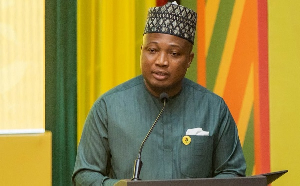Juaso (Ash), Feb. 26, GNA- The Ministry of Manpower, Youth and Employment has intensified efforts towards the elimination of child labour in cocoa growing areas to help sustain the high patronage of Ghana's cocoa on the world market.
Ghana's cocoa, which has over the years been widely acclaimed for its premium quality has in recent times suffered boycott threats on the world market following a United Nations (UN) report suggesting that children are being exploited in cocoa farms in Ghana. To this end, the Ministry in collaboration with other Non-Governmental Organisations (NGOs) have rolled out various programmes aimed at stemming the practice to sustain the cocoa industry, which is the mainstay of the nation's economy.
The programmes, which includes the formation of child protection committees at the district and community levels, workshops to build the capacity of committee members, public education as well as the withdrawal of victim's and their re-integration into society, would cover the Ashanti, Eastern and Western Regions. The Ministry and the Child Rights International, an NGO, has selected 30 communities in three Districts including Suhum-Kraboa-Coaltar, Kwaebibrim and Asante-Akim South to benefit from a community-based programme to identify victims of child labour. As a first step, a workshop has been organised for 50 community-based committee members drawn from selected communities at Juaso last Friday to sensitise participants on the significance of the programme. Mr P.K. Sarpong Siaw, Asante-Akim South District Co-ordinating Director, who opened the workshop said, cocoa was the life blood of the nation's economy hence it was imperative for stakeholders to join hands in the fight against child labour in cocoa farms. He expressed his concern over the number of people working in the cocoa industry, who were likely to lose their jobs apart from its effect on the economy in the event of a total ban of Ghana's cocoa on the world market.
He therefore implored the participants to play their respective roles effectively to ensure the success of the programme. Mr Bright Appiah, Executive Director of Child Rights International, noted that the programme was aimed at withdrawing child victims from cocoa farming activities and rehabilitate them in formal and informal institutions for skills and academic development for their future livelihood.
He said withdrawn children would then be assessed to discover their areas of interest and potentials to determine their appropriate placement, adding that the handing over of children in selected institutions of learning would be witnessed by programme officials, district officers, guardians and parents.
Mr Appiah added that the assemblies would liaise between the programme and institutions in which the children would be placed and also monitor their development and called for the co-operation of all stakeholders.
General News of Tuesday, 26 February 2008
Source: GNA












